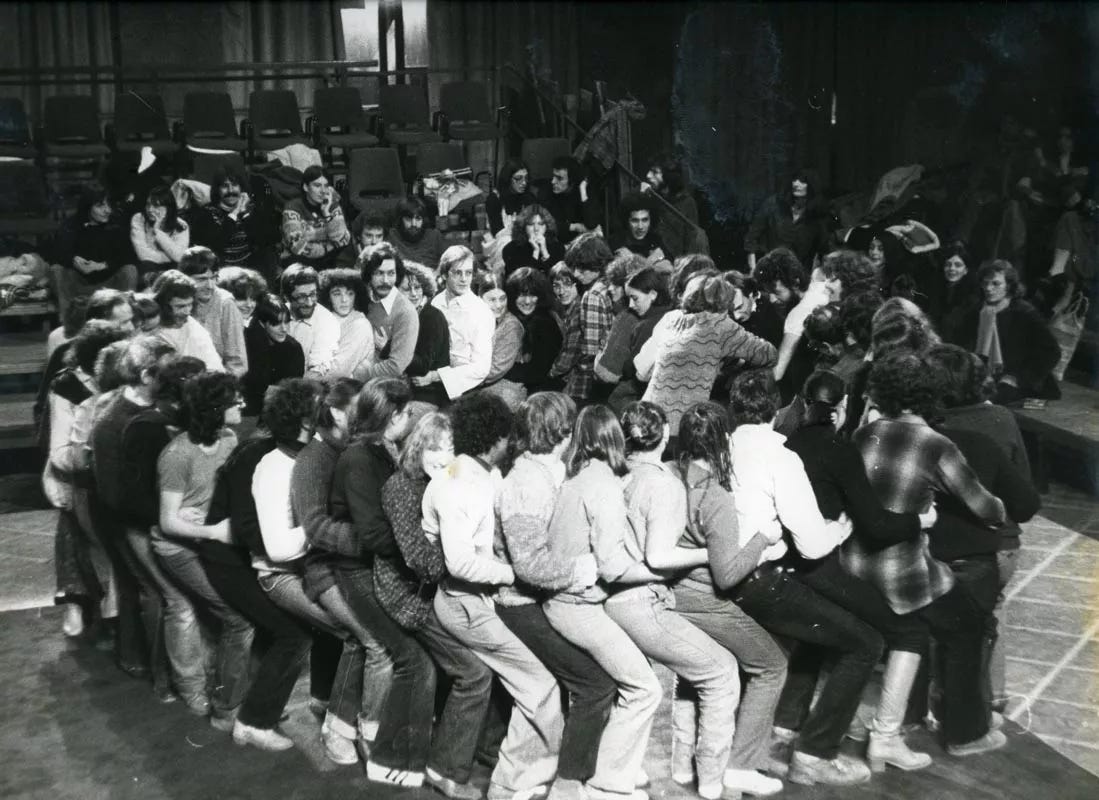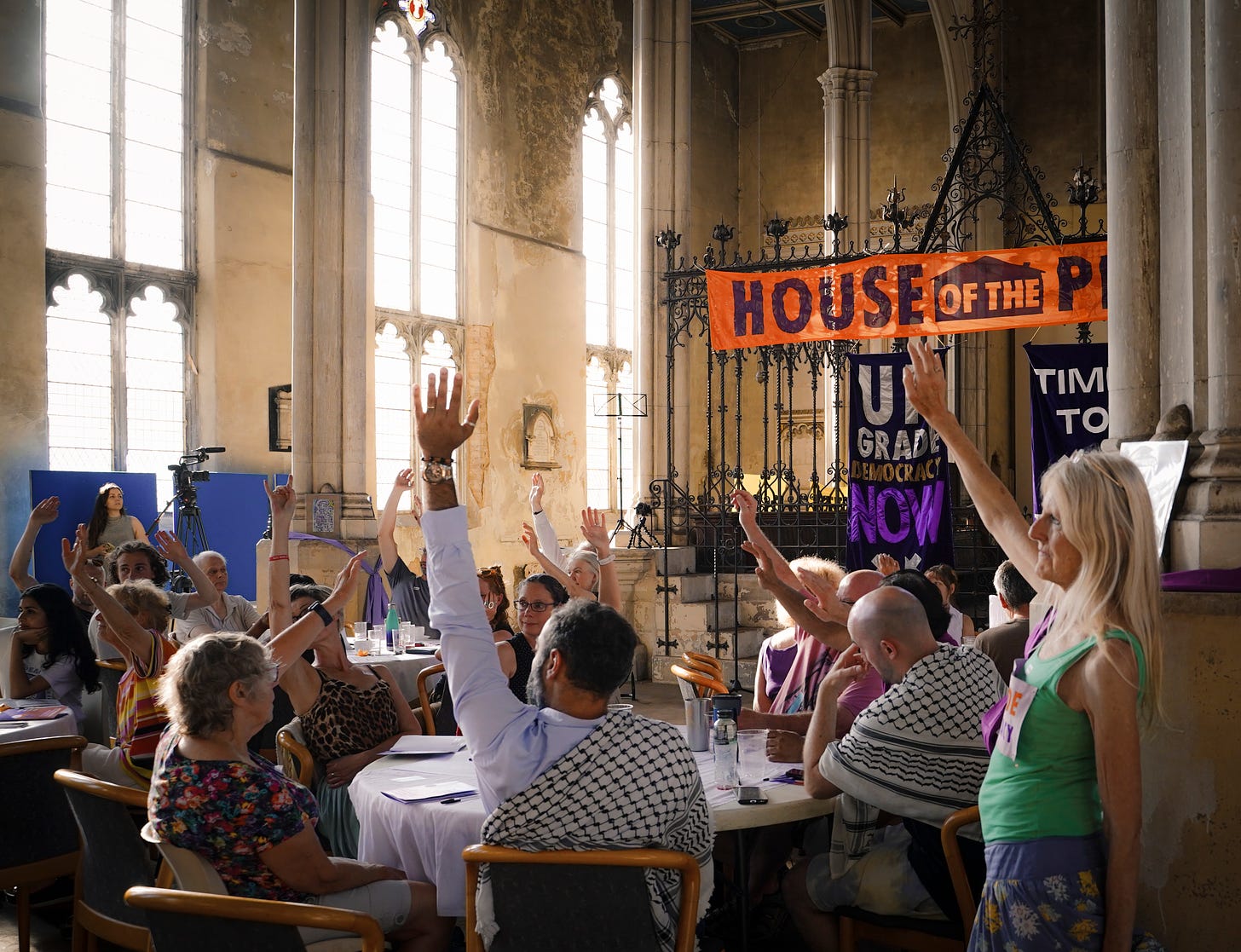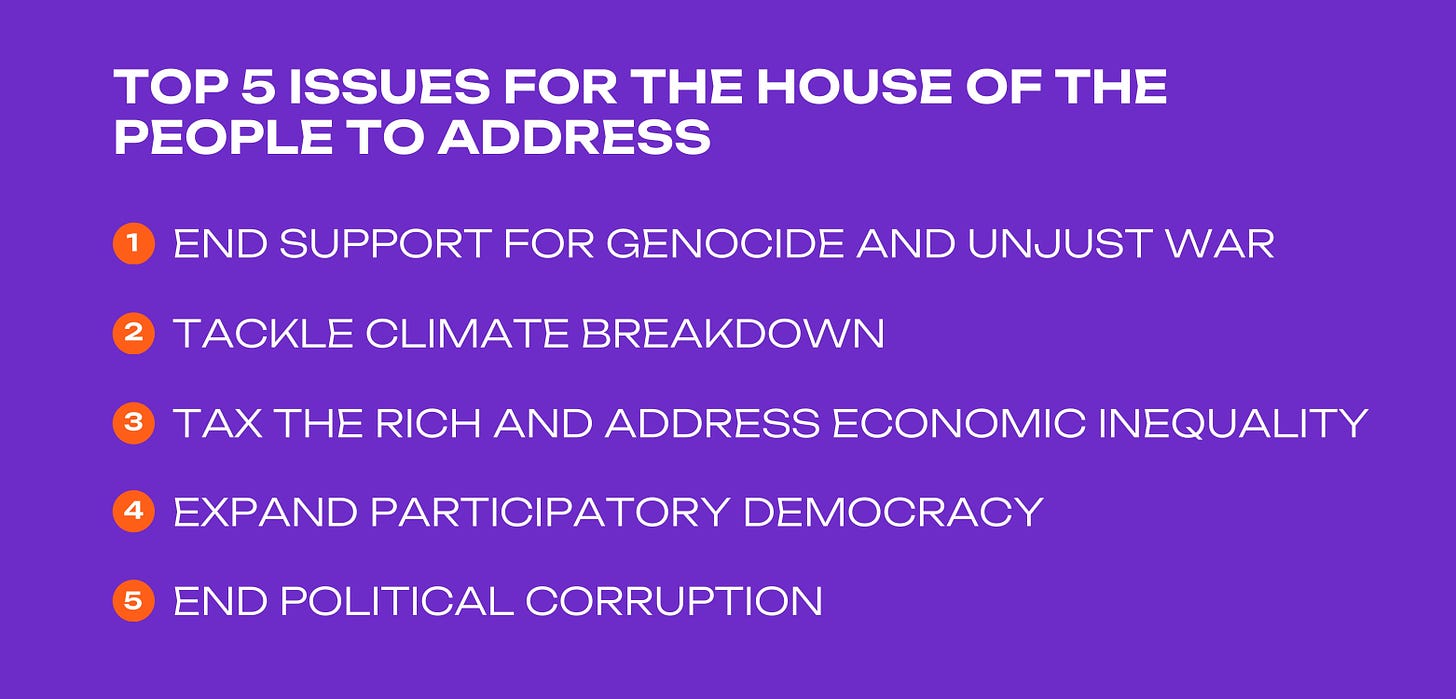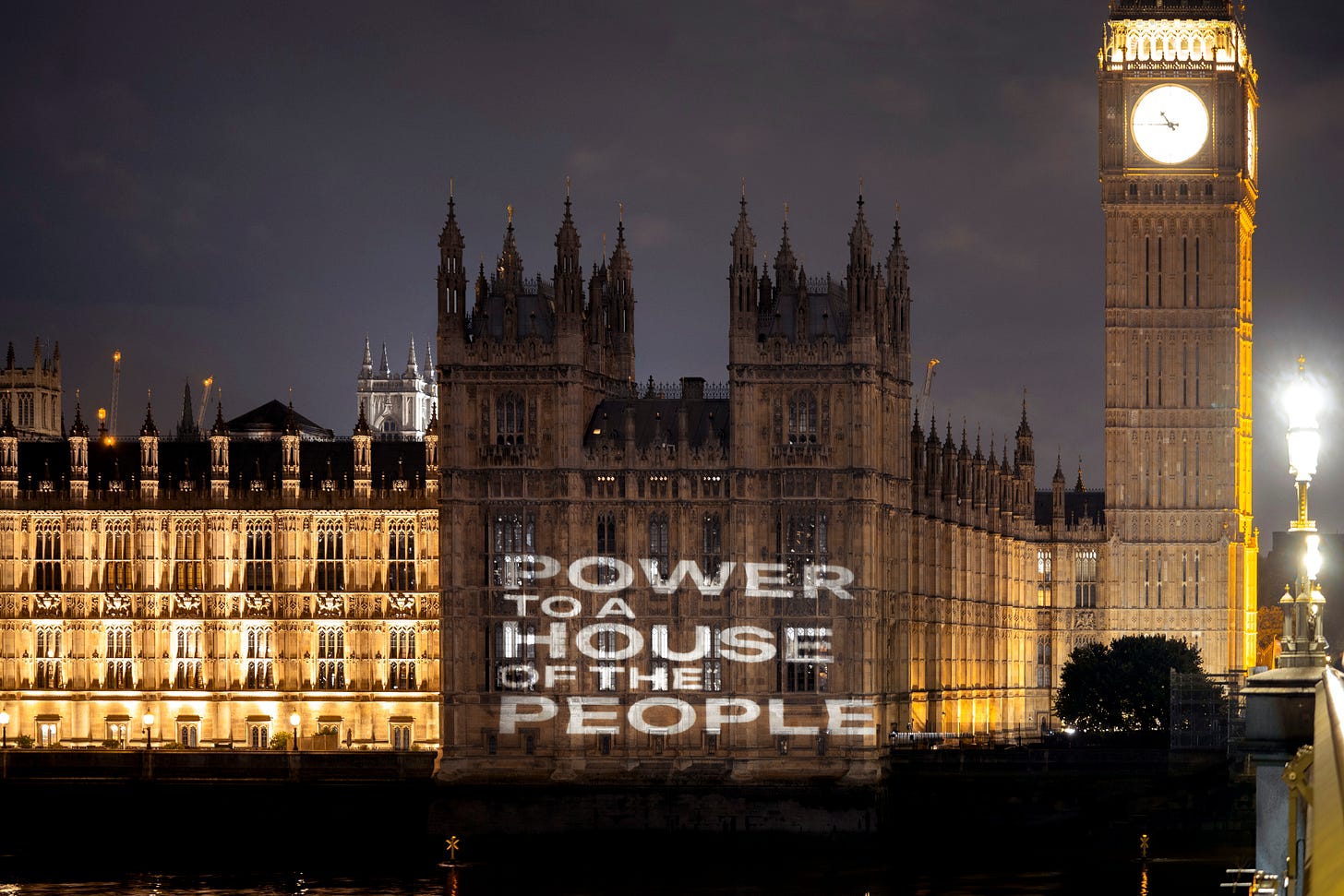This is what a real democracy could look like
Exploring the wild idea of a political system led by the people, not a group of rich men.
Our introduction this week is brought to you by the Green Fix team member Toninio Waelkens.
Last summer, I moved from Brussels to Berlin—a big step, as I had never lived outside Belgium before. At first, it felt like a gamble. I had to learn a new language and didn’t yet have a job. Although Berlin is close to Brussels and, in some ways, not so different, everything feels more extreme. I often tell people about the amazing summers but fail to mention how the sun almost completely disappears in winter. The city’s population is over three times bigger than Brussels’, and even though Berlin is "not Germany," people here can sometimes feel cold and distant.
During those first months, I found myself frequently complaining about public transport and bureaucracy. The inefficiency was frustrating. It felt like the motto here was: why make things simple when you can make them complicated? Of course, I’m aware Belgium has its own inefficiencies. But after years of hearing expats complain about my home country, it feels oddly freeing to be in a place where I don’t feel like I have to take responsibility for the system’s failings.
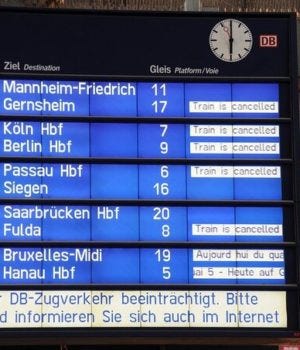
Germany might soon face snap elections. The three-party coalition collapsed over a budget dispute, and a no-confidence vote is on the horizon. Like many countries, Germany faces growing polarization, which leaves people feeling disconnected from politics. The weakening of centrist parties, though common worldwide, is particularly unsettling here given the country’s history. I follow these developments from a distance, knowing that my involvement is limited. As a non-citizen, I can’t vote in Berlin.
Yet even in Belgium, where I do vote, I never truly felt represented. Is it because of the televised debates over wokeness and whether historically offensive terms should still be used to describe Black individuals? Is it the statues of King Leopold II, who oversaw the deaths of millions of Congolese, still prominently displayed in cities like Brussels and Ostend? Or is it the pervasive silence about the ongoing genocide in Palestine? Whatever the reason, I often felt alienated from the political discourse in my home country too.
In October, I had the opportunity to explore these feelings of disconnection. I participated in a fellowship at Salzburg Global, where we brainstormed about innovative ways to reconnect citizens with politics. My team and I stumbled on an inspiring example from Brazil in the 1970s: Augusto Boal’s “Theatre of the Oppressed.”
This initiative engaged local communities in reenacting legislative scenarios, allowing them to directly shape the laws that affected their lives. The project, which later evolved into a “Legislative Theatre” was remarkably successful, resulting in 13 new laws on issues such as discrimination, domestic violence, and accessibility for individuals with disabilities.
As I reflect on my time in Berlin and the challenges facing both Germany and Belgium, I’m inspired by these examples of grassroots empowerment. Perhaps the answer lies in finding more ways to give people with lived experiences a voice—a chance to take ownership of the decisions that shape their lives.
What’s Going On?
How South Korea’s Robust Protest Culture Shut Down Martial Law—For Now.
Related: South Korean climate activists sued their government… and wonThe Global Plastics Treaty negotiations have fallen through – Is ‘No Deal’ the Worst Outcome?
Related: A reminder of why we need this treatyWhy did the French government fall and what happens next?
Related: Where does the French left stand on Climate refugees and energy policy?
Greenland’s peregrine falcons are a story of resilience in a changing Arctic
Related: As the UK appoints a nature envoy, how successful have her European counterparts been in government?The most dangerous place for a woman to be is in her own home, report finds.
Related: How women taxi drivers are providing safety from sexual violence in Bolivia.
The Green Fix is volunteer-led and relies on reader donations. If you have the means, please consider tipping us a virtual coffee.
If you would like to support another way, please share our work on social media! You can tag us @TheGreenFix_ on Instagram and The Green Fix on LinkedIn.
Focus On… Citizen Assemblies
Issy Pountney spoke to the team behind Assemble UK, the campaign to create a new democratic system led by people.
Assemble UK formed in early 2024 to tackle deepening social inequality and climate breakdown by bringing people together at community assemblies.
These are spaces where people share food, have a chat, and produce genuinely democratic visions about how we can fix the mess we’re in. Assemblies will feed into local charters to take to councils, and into campaigns for independents during elections. Our long term aim is to develop a UK-wide citizens assembly selected by sortition, the House of the People, ultimately to replace the House of Lords. Assemble is also fostering and funding a network of assembly projects internationally. Our international working group is connecting and launching assemblies around the world, with teams already in Germany, Italy and the USA. We have a long term vision for national citizens assemblies in as many countries as possible, all co-ordinating, ultimately to create a global assembly, which would potentially be able to produce an international People’s Charter. Of course we are a while away from this now, as we focus on launching the House of the People!
We need to change the way decisions are made.
Why now, and what is so wrong with our existing system?
There is a deep frustration with our broken political system right now.
It’s clear that Labour got the last election because of the widespread desire to get the Tories out, rather than any clear democratic mandate for their policies. By consistently favoring big corporations, politicians have destroyed trust in politics. The failure of Labour to offer any hopeful vision will only deepen this trend, as their low vote share at the last election indicated.
Useful: Why does everyone hate the Conservative Party in the UK so much?
The upside is that there is now a big opportunity to gain massive support across a wide range of people who are disenfranchised by the current system. We have the opportunity to push for a new, more democratic and inclusive way of making decisions throughout the UK.
There is already significant support for a whole range of progressive policies that are currently off the government’s agenda. The priorities drawn out by our launch event for the planned House of the People included wealth redistribution, urgent climate action, ending the UK’s support for the genocide in Gaza and other conflicts, tackling political corruption and upgrading our democracy so it genuinely reflects the interests of most people.
What kind of campaigns are you working on?
During the last UK elections in July 2024, we supported 30 assemblies. These assemblies developed community-driven manifestos which 26 independent candidates across the country ran on, including Shokat Adam who won a seat in Leicester South.
In August 2024, we held an open event inviting 100 members of the public to come together to look at the outputs from these assemblies and choose the priorities for discussion at the House of the People. This new national assembly will sit for the first time next summer when a representative slice of the UK, chosen by sortition, will come together to listen to the experts and lived experience, read reports from ongoing assemblies around the country and produce a new People’s Charter - a set of clear demands and policies with broad popular support.
Our first focus at the moment is supporting local communities to set up People’s Councils. These are local assemblies that work independently of existing local councils to produce popular demands for local government. Through these assemblies, citizens will be empowered to take collective action to achieve their demands. People’s Forums can also feed into sets of demands to be taken up by independent candidates in council elections.
For example, right now we are working with Jeremy Corbyn MP who is trailblazing this tradition of People’s Forums. The results of these assemblies are influencing how he’s engaging with his constituents and taking up their concerns with his powers as MP.
Ultimately, Assemble is working to embed assemblies as the tool for developing manifestos and selecting candidates while staying accountable to the community.
What does participatory democracy have to do with the climate crisis?
There’s a lot of important work showing that the climate crisis is caused by the same political and economic systems that are driving inequality and have led to flatlining political trust and participation. While there is a widespread and shared sense of frustration with how things are going, people naturally have different priorities.
Opening up spaces for people for whom climate is not the number one concern is vital to bring as many people together as possible. Understanding and reflecting these people's priorities will be vital to successfully using participatory democracy as the platform to build a broad and popular mandate for climate action. This climate action will be enriched and complimented by a much broader-sighted vision to transform our country and rethink our place in the world.
How do you make sure the process is actually representative and not just reproducing the same power dynamics as before?
Community assemblies happen in spaces at the heart of the community so that they are accessible, and emphasis is placed on doing lots of outreach to make sure people have heard about the assembly.
We ensure outreach brings in marginalised demographics and encourage campaigns to connect with trusted community groups. We encourage people to provide food, childcare and music at their launch events and assemblies so they don’t feel like ‘the usual political event’. Assemblies are carefully facilitated to make sure that everyone has an equal amount of time to speak, and people are encouraged to draw on their personal experience, so that everyone is assured their contribution will be valued and assemblies stay attuned to local needs.
We’ve already been working in a wide range of places through our campaigns during and after the general election to get a broad representation of the country and will use sortition to invite the public to participate at the House of the People. We are constantly improving this work to ensure the assemblies, core team, and facilitators reflect a rich diversity of backgrounds.
As we grow, this will include rotating leadership overseen by an independent committee, decentralised decision-making, free festivals with political education and more!
How can people within and outside of the UK get involved?
The best way for people reading this to get involved is to come to one of our welcome calls! You can also find out about in-person national (UK) events on our website. Then there are two main ways to get involved in the project. You can join your Local Team to get Assemble going where you live. If there’s not a Local Team near you, you can set up your own. Either way, we’ll support you throughout.
You can also join the National Team! Here we train people to help out with everything from media to research, event design, calling, welcoming volunteers, fundraising, being a spokesperson and more - there’s space for everyone, whatever your background, and however much time you have to give.
If you’re not in the UK, our international working group meets weekly with the aim of exploring and expanding this model of decision making across the world. At the moment we have national groups in the UK, Italy, Germany and the USA, but it’s not going to stay this way so we’d love anyone to reach out to this email (molly@timetoassemble.org) if you’re interested in getting involved in our work from wherever you’re based!
Note from Green Fix team: If you’re not in the UK, you could also check out initiatives for citizens assemblies like Iswe (global) and Citizens Take Over Europe (EU).
So Now What Do I Do?
LEARN SOMETHING
Listen to this short TED talk: How can everyday people help foster and protect democracy?
Read: Getting real: A new theory of change for citizens’ assemblies.
Are you on Bluesky? Here’s a bunch of experts working on alternative economies to follow.
DO SOMETHING
Brussels: Join Artivists for Palestine for art and solidarity from 13th - 14th December from 17h in Espirito Mundo.
How to talk to family members with different political views over the holidays.
CHANGE THE SYSTEM
Robert Bosch Stiftung is funding organisations tackling economic injustice. Apply by 15 December!
The UN is asking people under 35 to fill out their open survey about decent work for youth by 17 December.
Sign the European Citizens’ Initiative to ban conversion therapies for LGBTQ+ people.
The Green Fix is now offering low-cost sponsored slots on the newsletter. Book your slot by emailing wearethegreenfix@gmail.com.
Stay in the loop
You can follow us on Twitter @TheGreenFix, Instagram @thegreenfix_ and LinkedIn. Connect with Cass on Instagram @cass.hebron, Bluesky @cass-hebron.blsky.social and LinkedIn Cass J Hebron.







